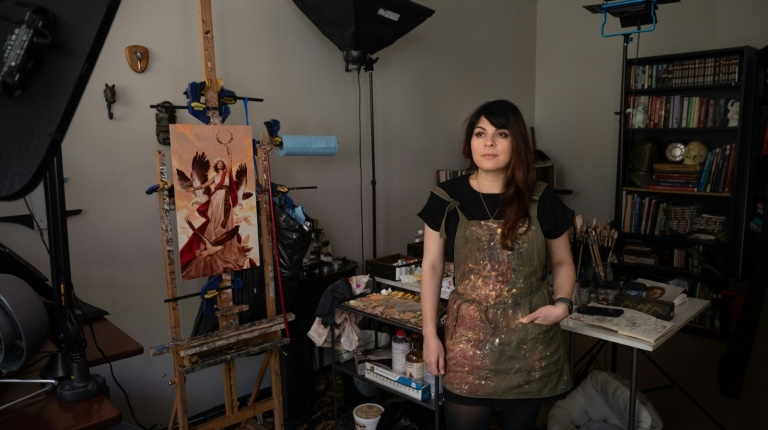Karla Ortiz, a Puerto Rican artist based in California, is concerned about the increasing prevalence of generative artificial intelligence (AI) in her industry. The technology is behind apps like Dall-E and ChatGPT and can create original content, such as illustrations and computer code, with just a simple prompt. Ortiz discovered an open-source AI-based image generating tool called Disco Diffusion about a year ago, but found that it was using her friends’ work without their permission. She was unconcerned at first but became increasingly alarmed as more powerful programs emerged, such as Midjourney and Stable Diffusion, which can generate images in the style of a particular artist. Ortiz believes that art theft is nothing new in her line of work, but generative AI is taking it to a new level. She worries that young artists will be squeezed out by AI and unable to develop their own unique style, as the technology undermines their ability to find their voice through their own experiences and thoughts of the day. Karla Ortiz, along with other artists, has filed a lawsuit against three generative AI companies in a California court, in hopes of getting the industry regulated.
Artist Karla Ortiz is concerned about the increasing prevalence of generative artificial intelligence (AI) in her industry. The technology is behind apps like Dall-E and ChatGPT and can create original content, such as illustrations and computer code, with just a simple prompt. Ortiz discovered an open-source AI-based image generating tool called Disco Diffusion about a year ago, but found that it was using her friends’ work without their permission. She was unconcerned at first but became increasingly alarmed as more powerful programs emerged, such as Midjourney and Stable Diffusion, which can generate images in the style of a particular artist. Ortiz was shocked to discover that these programs were using their training data and material from existing artists like herself. Ortiz believes that art theft is nothing new in her line of work, but generative AI is taking it to a new level. She worries that young artists will be squeezed out by AI and unable to develop their own unique style, as the technology undermines their ability to find their voice through their own experiences and thoughts of the day. In response, Ortiz has created a new work, “Musa Victoriosa,” which embodies artists defiant against technology. She argues that influences can only take artists so far in their work; the rest is their training, experiences, and unique perspective.
Karla Ortiz, along with other artists, has filed a lawsuit against three generative AI companies in a California court, in hopes of getting the industry regulated. She warns that Silicon Valley investors want to expand to every creative endeavor, which will cause great concern for writers and voice actors, in addition to designers. Ortiz believes that their profession was automated first, making them the canary in the coal mine. She worries that generative AI will undermine the ability of young artists to break into the industry and develop their own unique style, as it could be used to train models on their work.
Don’t miss interesting posts on Famousbio










